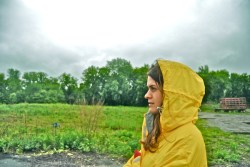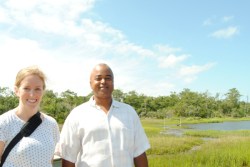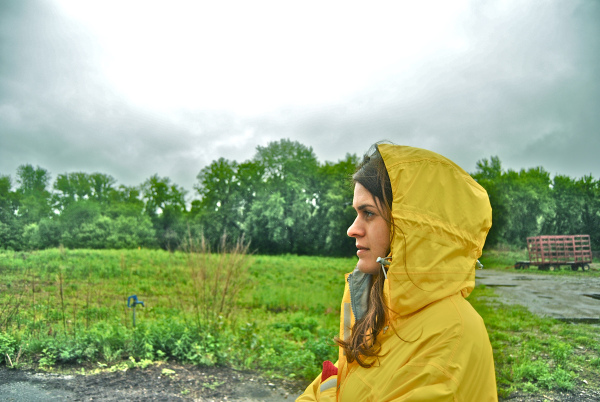
Allie Goldstein.
The Great American Road Trip — it’s a rite of passage, a national pastime, and increasingly, a tool for spreading the word about looming climate catastrophe. Each summer, a motley parade of veggie buses, vintage motorcycles, and bicycles circulates around the country, its participants out to preach the gospel of green living, and perhaps learn a thing or two in the process.
Two of these eco-minded road trippers, Kirsten Howard and Allie Goldstein, recently dropped by the Grist offices in Seattle to tell us about their adventures aboard a 2000 Toyota Sienna minivan. The duo, who recently graduated from the University of Michigan’s School of Natural Resources and Environment, called their adventure the Great American Adaptation Road Trip. Their mission: to ferret out tales of how local people are adjusting to a warmer world.
That’s a little defeatist, innit? What about preventing climate change, guys?
“When I was in graduate school, I read Bill McKibben’s ‘Terrifying New Math’ story in Rolling Stone,” Goldstein said. “That piece had a big impact on me: Even if we stopped emitting [greenhouse gases] today, we’d continue to see impacts through mid-century.”

Kirsten Howard and Tancred Miller at the living shorelines project at Pine Knoll Shores, N.C.
Howard’s bubble burst after college, when she was living in Washington, D.C. She had been watching climate legislation work through Congress in the early Obama years. “We thought they had the votes. The healthcare plan had just passed,” she said. When the legislation went down in flames, “the idealism from college got knocked out of me. I woke up to the realities.”
Their trip took them from the flood-prone lowlands of Virginia to the flammable forests of New Mexico to the oyster grounds of Washington state. Along the way, they found some stories that gave them hope that, even if we can’t stop climate change, we may at least be able to slow it — and in the meantime, we can at least brace for the inevitable.
Here’s a taste of what they found — a story about their visit with the leader of the Gullah/Geechee people in coastal South Carolina:
The Gullah/Geechee people, descendants of enslaved Africans captured in Angola and other parts of the Western Seaboard of Africa who now stretch from Jacksonville, North Carolina to Jacksonville, Florida, do not have a word for “adaptation” or “resiliency” in their Creole language. And yet, as Queen Quet, the elected head-of-state for the Gullah/Geechee, explains, the Gullah/Geechee are an incredibly resilient people: they maintained their culture through slavery and today continue traditional farming practices on family compounds.
“What we understand, or overstand as I like to say — that’s what others call adapting,” Queen Quet said. “We call it living.”
Here’s a video of Queen Quet speaking about resiliency. (She starts the video speaking in her people’s Creole dialect, but slides into clear English a minute or two in.)
For more of Howard and Goldstein’s stories, check out their blog.
Oh, and that minivan? Not the most climate-friendly set of wheels going. Not to worry, they said. They bought carbon offsets to make up for their emissions.



